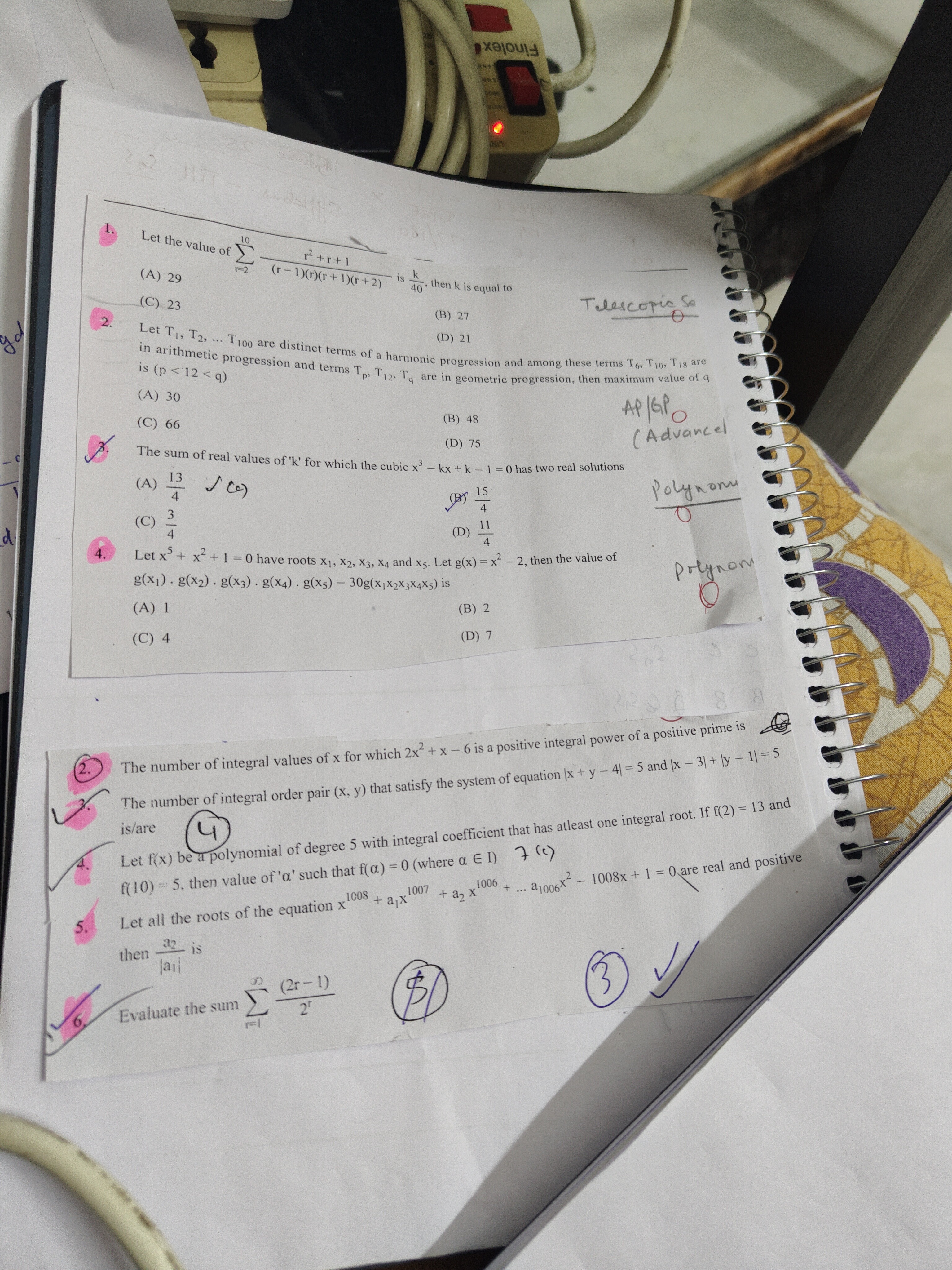Question
Question: Let the value of $\sum_{r=2}^{10} \frac{r^2+r+1}{(r-1)(r)(r+1)(r+2)}$ is $\frac{k}{40}$, then k is e...
Let the value of ∑r=210(r−1)(r)(r+1)(r+2)r2+r+1 is 40k, then k is equal to

29
27
23
21
23
Solution
The general term of the sum is Tr=(r−1)r(r+1)(r+2)r2+r+1. We can rewrite the numerator as r(r+1)+1. So, Tr=(r−1)r(r+1)(r+2)r(r+1)+1. This can be split into two parts: Tr=(r−1)r(r+1)(r+2)r(r+1)+(r−1)r(r+1)(r+2)1 Tr=(r−1)(r+2)1+(r−1)r(r+1)(r+2)1
Now, we use partial fraction decomposition for each part to make them telescoping sums. For the first part: (r−1)(r+2)1=31(r−11−r+21). For the second part: (r−1)r(r+1)(r+2)1. We observe that (r−1)r(r+1)1−r(r+1)(r+2)1=(r−1)r(r+1)(r+2)(r+2)−(r−1)=(r−1)r(r+1)(r+2)3. So, (r−1)r(r+1)(r+2)1=31((r−1)r(r+1)1−r(r+1)(r+2)1).
Substituting these back into Tr: Tr=31(r−11−r+21)+31((r−1)r(r+1)1−r(r+1)(r+2)1).
Let's sum the first part: S1=∑r=21031(r−11−r+21). S1=31[(11−41)+(21−51)+(31−61)+(41−71)+⋯+(91−121)]. This is a telescoping sum. The terms −41,−51,…,−91 cancel with 41,51,…,91. S1=31(1+21+31−101−111−121).
Now, let's sum the second part: S2=∑r=21031((r−1)r(r+1)1−r(r+1)(r+2)1). Let f(r)=r(r+1)(r+2)1. Then the sum is 31∑r=210(f(r−1)−f(r)). S2=31[(f(1)−f(2))+(f(2)−f(3))+⋯+(f(9)−f(10))]. This is also a telescoping sum. S2=31(f(1)−f(10)). f(1)=1⋅2⋅31=61. f(10)=10⋅11⋅121=13201. S2=31(61−13201).
The total sum S=S1+S2: S=31(1+21+31−101−111−121)+31(61−13201) S=31(1+21+31+61−101−111−121−13201). First group of terms: 1+21+31+61=66+3+2+1=612=2. So, S=31(2−101−111−121−13201). To combine the fractions, find a common denominator. 1320=10⋅132=11⋅120=12⋅110. S=31(2−1320132−1320120−1320110−13201) S=31(2−1320132+120+110+1) S=31(2−1320363) S=31(13202⋅1320−363) S=31(13202640−363) S=31(13202277). Both 2277 and 1320 are divisible by 3. 2277/3=759. 1320/3=440. So, S=440759. We are given that S=40k. 40k=440759 k=440759⋅40=11759. k=69.
Let's recheck the decomposition Tr=(r−1)r(r+1)(r+2)r(r+1)+1. Another simpler decomposition is: Tr=(r−1)r(r+1)(r+2)r2+r+1=(r−1)r(r+1)(r+2)r(r+1)+1 =(r−1)(r+2)1+(r−1)r(r+1)(r+2)1 We know (r−1)(r+2)1=31(r−11−r+21). And (r−1)r(r+1)(r+2)1=31((r−1)r(r+1)1−r(r+1)(r+2)1). So Tr=31((r−11−r+21)+((r−1)r(r+1)1−r(r+1)(r+2)1)). This is the same as before. Let me recheck the calculation of k. S=440759. k=11759=69. This value is not in the options. Let me check the decomposition one more time.
Let's try a different decomposition: Tr=(r−1)r(r+1)(r+2)r2+r+1 Notice that r2+r+1=(r2+r−2)+3=(r−1)(r+2)+3. This was used. Also r2+r+1=r(r+1)+1. Tr=(r−1)r(r+1)(r+2)r(r+1)+1=(r−1)(r+2)1+(r−1)r(r+1)(r+2)1. This is correct.
Let's consider the form Tr=F(r)−F(r+1). Let F(r)=(r−1)r(r+1)Ar+B. This is usually for N(r)/D(r) where D(r) has 3 terms. Let's try Tr=31(r−11−r+21)+31((r−1)r(r+1)1−r(r+1)(r+2)1). This is what I used.
Let's check the sum S1=31(1+21+31−101−111−121). S1=31(66+3+2−66066+60+55) S1=31(611−660181)=31(66011⋅110−181)=31(6601210−181)=316601029=660343. This is correct.
Let's check the sum S2=31(61−13201). S2=31(1320220−1)=311320219=132073. This is correct.
Total sum S=S1+S2=660343+132073=13202⋅343+132073=1320686+73=1320759. This is correct.
S=1320759. We need to simplify this fraction. 759=3×253=3×11×23. 1320=10×132=10×3×44=10×3×4×11=3×40×11. So, S=3×40×113×11×23=4023. The value of k is 23.
My previous calculation k=69 was due to an error in simplifying 759/11. 759/11=69 is correct, but k was not 759/11. k=440759⋅40=11759 was an intermediate step. The final relation is S=40k. So 4023=40k. This means k=23.
The calculation is correct now.
